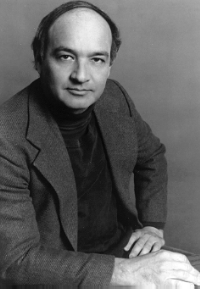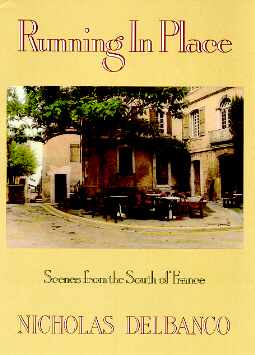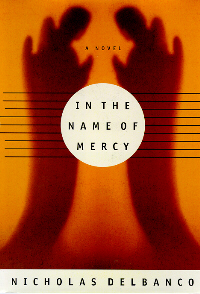
| NYWI HOME PAGE | VISITING WRITERS & EVENTS INDEX | VIDEO ARCHIVES |
 |
Nicholas Delbanco is a consistently highly acclaimed writer who has authored 15 books including novels, collections of short stories, and non-fiction works. His novels include the newly released Old Scores, In the Name of Mercy (1994), The Martlet's Tale (1966), Consider Sappho Burning (1969), News (l 970), In the Middle Distance (1971), Small Rain (1975), and The Sherbrookes Trilogy (1978). Delbanco's non-fiction works include The Beaux Arts Trio, Group Portrait, and Running in Place: Scenes from the South of France. He has two collections of short fiction, About My Table and The Writer's Trade and Other Stories (1990) and a collection of short stories.
Delbanco, a British-born American, received his B.A. from Harvard and his M.A. from Columbia University. He was a professor in the department of language and literature at Bennington College from 1966-85. Currently he directs the Hopwood Awards Program and the M.F.A. program in creative writing at the University of Michigan, Ann Arbor.
Delbanco's work has received numerous awards and honors including the National Endowment for the Arts Creative Writing Fellowship and a Guggenheim Fellowship.
"An excellent writer is among us, and if we neglect him, we shall have to
apologize to posterity." - The New York Times
"Nicholas Delbanco writes like an inspired maniac, with a brilliant
outpouring of image and idea..." - Patticia Meyer Spacks, The Hudson Review
"...as fine a pure prose stylist as any writer living..." - Chicago Tribune
Book World
Provence: Its magnificent landscape has inspired artists and writers for centuries. In this stunning evocation of Provençal culture and history, the critically lauded novelist and essayist Nicholas Delbanco captures both the immediacy of this changing region and the time-honored traditions of its past.
Born in England during the Second World War, raised in America, Delbanco spent many of the most important periods of his life in Provence. Ensconced in a farmhouse deep in the Alpes-Maritimes, writing books, he developed lasting friendships with his neighbors, including expatriate novelist James Baldwin. His narrative deals with the stages of age--from his first, carefree visits and an early love affair to his transformation into the "solid citizen" who imitates his parents while guiding his children through the streets.
In 1987 Delbanco returned to Provence with his family, planning "a sentimental journey to our early haunts. It is to be, I tell myself, a chance to travel with our daughters before we drift apart, a chance to share our past with them before it proves irrecoverable." With the mind of a historian and the eye of an artist, Delbanco gracefully weaves strands of Provençal life into scenes from his own past and present.
In the precise, mellifluous language that prompted the Chicago Tribune Book World to call him "as fine a pure prose stylist as any writer living," Delbanco provides a personal record of one of the world's most fertile regions. He writes of the landscape of Petrarch and Laura, Cezanne and van Gogh, the Marquis de Sade and Albert Camus ("who made his home in Lourmarin because of the size of the sky"); of Provence's thirty two winds; and of aristocrat and peasant, cave and vineyard, restaurant and gallery, coal stoves and mimosa, cars and climbing roses, stone walls and bittersweet--describing a paradise still pure, but not immune to progress. This book will bear comparison to Hemingway's account of France; it, too, is a moveable feast.
 In Running in Place, Nicholas Delbanco explores two histories--that of the south of France and his own personal one there. He combines them with such keen insight, humor, and thoughtfulness that reading it is like taking a trip yourself, and coming out a wiser richer person for having gone there."
In Running in Place, Nicholas Delbanco explores two histories--that of the south of France and his own personal one there. He combines them with such keen insight, humor, and thoughtfulness that reading it is like taking a trip yourself, and coming out a wiser richer person for having gone there."
-Ann Hood, author of Somewhere off the Coast of Maine
The unique charms of Running in Place are to be found in Delbanco's novelistic abilities. Characters--however briefly they appear in this memoir of the south of France--are fully fleshed, acutely seen, heard, rendered. We almost taste the earth and the sun across the hills. Delbanco is a master of a prose that evokes place and time in language as clear as certain early Matisses, and this is an enchanting and very readable book about place and people, intimacy and transience, which also makes it first-rate travel writing . . ."
- Richard Elman, author of Cocktails at Somoza’s
 "Nicholas Delbanco’s medical thriller is uncannily insightful about love, sex, and money. Here is wonderful writing, memorable entertainment, a must-read novel."
"Nicholas Delbanco’s medical thriller is uncannily insightful about love, sex, and money. Here is wonderful writing, memorable entertainment, a must-read novel."
- Frederick Busch
There is a fine line between mercy
killing and murder...
Dr. Peter Julius believes a physician should relieve misery, not prolong it. When his cancer-stricken wife is racked with pain and asks for his expert help, he does what all good doctors do--he stops her suffering.
After her death, the young doctor is offered a position in a hospital-affilated, mid-Michigan hospice that will allow him to continue his new mission, helping terminal patients end their lives with dignity. Soon, however, patients in both the hospice and hospital are dying at an unusually high rate, all under his care. People start whispering about the trail of bodies, the media vultures circle overhead, and hate mail arrives at the local paper calling Peter the Angel of Death.
Yet suspicion falls on other medical professionals as well. There's the nurse who'll do anything for a ticket to Paris; the chief resident who works too many shifts for too little money; the hospital president whose business tactics are nothing short of cutthroat; and the visiting euthanasia expert who helped terminate her own husband's life-and who falls in love with Peter Julius.
In the arms of his new lover, the doctor starts to heal. But the young couple's bond has formed in the valley of death, and what was once the humane practice of medicine has turned sinister. Now as the killings tally up, even the healthy are in danger, for no one's immune to treachery. . .or murder.
With his extraordinary ability to observe and reveal human nature, Delbanco challenges us to question our own ethics-and those of the health-care professionals we trust. A masterfully crafted story that exposes the inner workings of the medical world, In the Name of Mercy reaches into our lives and leaves us
pondering its frightening implications long after the last page is turned.
ADVANCE PRAISE FOR IN THE NAME OF MERCY
"Manages wonderfully to engage a central and immediate moral issue of our culture while bringing to the reader the suspense, the shocks, and the accelerating excitement of a very superior kind of thriller. It is genuinely moving in places, darkly and savagely funny in places sometimes the same places-and it is marked throughout by Delbanco’s customary elegance of language and thought."
- Thomas Flanagan
"Not only a masterful suspense novel with a heady romance and a compelling mystery at its center, but also a moral imperative. A terrific book."
- Antonya Nelson
"In the hands of a writer as gifted and experienced as Nicholas Delbanco, hard cases can make good novels. There' no case harder than death, and In the Name of Mercy stares it straight on, in relentless focus, with precise, felt tenderness. The language here is gorgeously direct, idiomatic without sacrifice of dignity. This novel does honor to the dead and to the dying: that's all of us."
- Geoffrey Wolff
"A novel of eerie intrigue by a master storyteller, guaranteed to quicken the reader's pulse. A novel both cunning and wise, urbane and raw.... I was utterly captivated."
- Lynne Sharon Schwartz
"An audacious and unpredictable novel that provides suspense and wit
on the one hand and serious ideas for contemplation on the other."
- Rosellen Brown
Nicholas Delbanco gave a reading at the New York State Summer Writers Institute at Skidmore College on July 18, 1997.
Additional Links:
Writers Online Magazine Article
The Writer TV Program